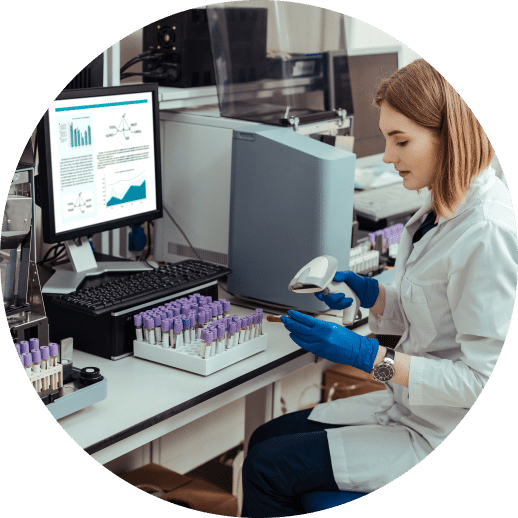Transformation Projects
Genomics in Pharmacy
Developing the role of pharmacy in delivering genomics driven precision medicine and personalised treatment

Genomics has had an impact in pharmacy for many years, most notably the development of drugs targeting specific genetic changes within diseases such as cancer and some rare diseases e.g., cystic fibrosis. These are known as drug-gene matches and have led the way in precision medicine.
More recently focus is now shifting towards pharmacogenetics, which combines the science of pharmacology to the field of genetics to predict how an individual will respond to a drug.
Within North Thames the pharmacy team has evaluated a pharmacogenetic testing and clinical pathway for DPYD, a gene which codes for an enzyme called DPD which is needed for the metabolism of fluoropyrimidine containing anti-cancer treatments. Patients with variations within the DPYD gene may be more susceptible to side effects and by identifying these individuals the fluoropyrimidine dose can be adjusted. For more information on our work involving pharmacogenetics, including DPYD can be found below.
As the role of precision medicine and pharmacogenetics evolves and becomes part of our routine clinical practice, pharmacy professionals across all sectors will have a role in developing, testing and delivering these services.
To ensure the pharmacy profession within North Thames is supported to deliver safe, effective and equitable use of precision medicine and personalised treatment we are:
- Establishing a pharmacy collaborative network across all sectors to develop the role of pharmacy and pharmacy professionals in pharmacogenomics and in the use of precision medicine based on genomic results.
- Reviewing workforce development needs and delivering education and training opportunities to support the pharmacy workforce to realise the benefits of pharmacogenomics for medicines optimisation and precision medicine.
- Establishing metrics for pharmacy teams to monitor the use of genomics in practice, and linking the work of the NHS Genomic Medicine Service with the wider medicines optimisation framework in the NHS e.g. Regional Medicine Optimisation Committees.
If you would like to join the pharmacy collaborative network please contact dharmisha.chauhan1@nhs.net where you will be added to our distribution list which contains information on education and training webinars, update on regional and national genomic medicine projects. You can also get in touch to request tailored education and training opportunities.
Education and Training opportunities in the North Thames
We deliver resources and educational sessions for pharmacists and pharmacy colleges in our region.
The North Thames GMS is delivering collaborative Transformation Projects to achieve our ambitions, contributing to the clinical and practice research evidence base.
Find out more about pharmacy projects in our region below;
DPYD National Transformation Project was a national initiative to optimise and standardise the equitable implementation of DPYD pharmacogenomic testing by identifying barriers and building recommendations for multidisciplinary pathways and data collection, as an exemplar for future pharmacogenomic pathways. The project also aimed to identify any areas of improvement within the clinical effectiveness of DPYD pharmacogenomic testing.
One area where pharmacogenomics could be valuable is in mental health, to help choose and tailor the dosing of psychotropic drugs based on an individuals genetic variants. This is a new area of medicine, and the North Thames GMSA are working to support pharmacists working within mental health to investigate how this innovation could be incorporated into routine practice.
In January 2021 the MHRA released an alert for a rare mitochondrial gene change called m.1555A>G. This genetic change has an estimated prevalence of 0.2% in the general population and if found can cause ototoxicity in individuals who are treated with aminoglycosides e.g., gentamicin, within normal therapeutic ranges after one dose. In severe cases it can lead to bilateral hearing loss.
On the NHS, this found within the National Test Directory, is commissioned for individuals who have a predisposition to gram negative infections or for individuals to have structural/voiding genitourinary tract disorders. These individuals are more likely to be prescribed aminoglycosides within their treatment pathway for prolonged periods of time. Additionally, individuals who have hearing loss and prior exposure of aminoglycosides are also eligible for testing.
Within the North Thames GMSA we have been working with cystic fibrosis healthcare providers to ensure equitable uptake of testing across the region and at a national level work is underway to support the implementation of testing across other clinical areas.
The North Thames pharmacy team have educational and training webinar for m.1555A>G where you can learn more about this test.
If you would like to know more about these pharmacogenetic test, please contact the North Thames Pharmacist Dharmisha Chauhan. Email: dharmisha.chauhan1@nhs.net
Thiopurines such as 6-mercaptopurine (6-MP) are important cytotoxic agents, but their utility can sometimes be offset by poor patient tolerance and a risk of severe neutropenia (low white blood cell count). TPMT and NUDT15 are key enzymes in the metabolism of 6-MP and genetic variation in the TPMT and NUDT15 genes strongly influences the tolerance and safety of 6-MP therapy.
Enzyme activity is regulated by common genetic polymorphisms and reduced activity of these enzymes is one of the factors associated with dose limiting neutropenia. Genetic testing of TPMT and NUDT15 allows at risk patients to be identified and dosing of thiopurines to be individualised. This means we can reduce the toxicity risk for patients without loss of treatment effectiveness or compromising disease control.
In April 2022 the North Thames Genomic Laboratory Hub post approval via the National Test Directory now offer TPMT and NUDT15 testing, and protocols and guidelines are available to aid clinicians to support thiopurine dosing adjustments.
Please note that this test is only commissioned for Acute Lymphoblastic Leukaemia only and NOT for gastrointestinal disorders.
The North Thames pharmacy team have educational and training webinar for TPMT and NUDT15 testing where you can learn more about these tests.
If you would like to know more about these pharmacogenetic tests, please contact the North Thames Pharmacist Dharmisha Chauhan. Email: dharmisha.chauhan1@nhs.net
Workforce development and engagement with genomics is key to ensure the NHS workforce has the right knowledge, skills and attributes to deliver new and evolving standards of care. Competency frameworks (CF) provide a comprehensive structure allowing healthcare professionals a method to support their learning and development needs from fundamental principles to advanced practitioner level. Consistency in genomic literacy mapping is key to understanding an individuals’ knowledge base and helps to identify gaps in their personal development, forming a basis for planned developmental learning.
Health Education England (HEE) Genomic Education Programme (GEP) has developed a national high-level GEP genomic advisors competency framework (CFv1), which is suitable for professionals across different healthcare disciplines.
For more information, visit the Competency Framework project page.
We publish quarterly updates for pharmacy colleagues in our region. If you would like to be added to our mailing list, please email dharmisha.chauhan1@nhs.net.
North Thames Pharmacy Genomic Network Newsletters
Further Resources
GeNotes – genomic notes for clinicians – is a ‘just in time’ educational resource for healthcare professionals working in the NHS, developed by NHS England’s Genomics Education Programme in collaboration with clinical and scientific experts from across the health service.
GeNotes provides educational information at the point of need, with opportunities for extended learning. A specific pharmacogenomics section is also coming soon.
A website containing genomic medicine educational and training resources.
Provides definitions for common genetic and genomic terminologies.
The CPPE has designed this online training package to introduce you to genomics and pharmacogenomics, and to highlight the opportunities they can bring to the provision of person-centred care in your area of practice. It will also allow you to explore the application of genomics and pharmacogenomics in the larger healthcare context.


